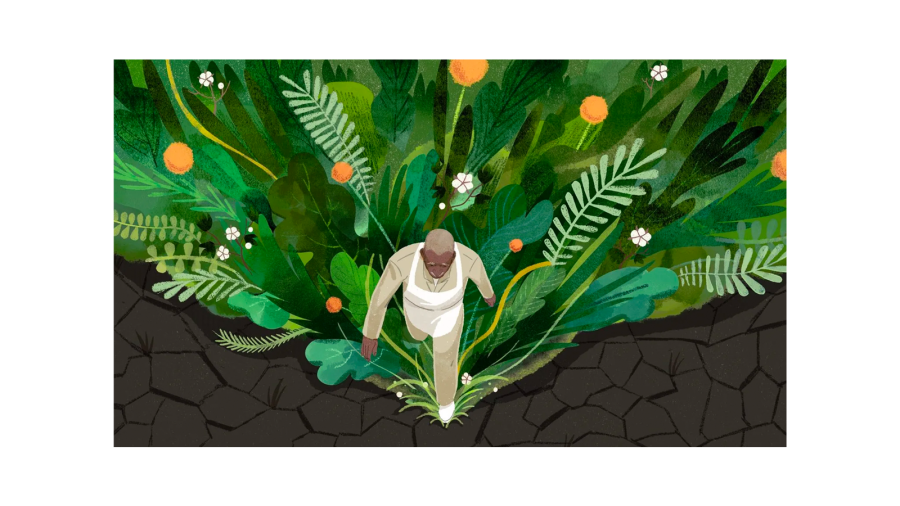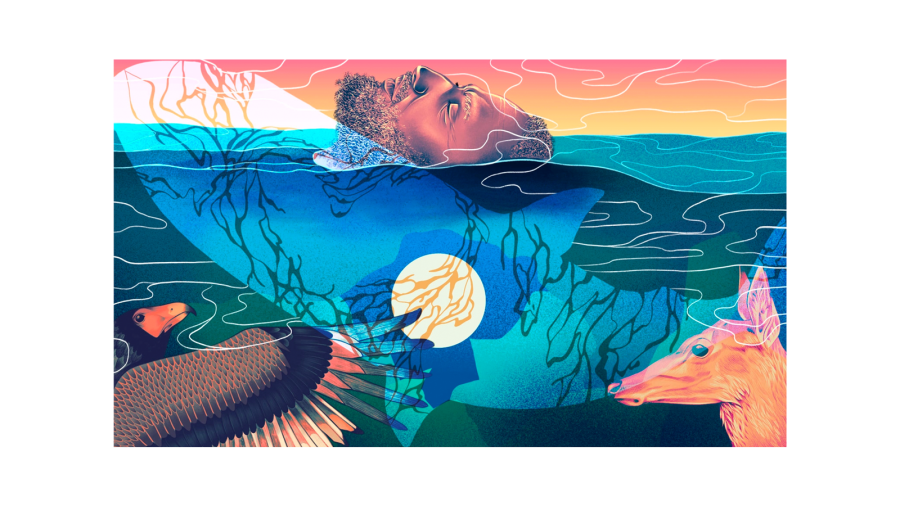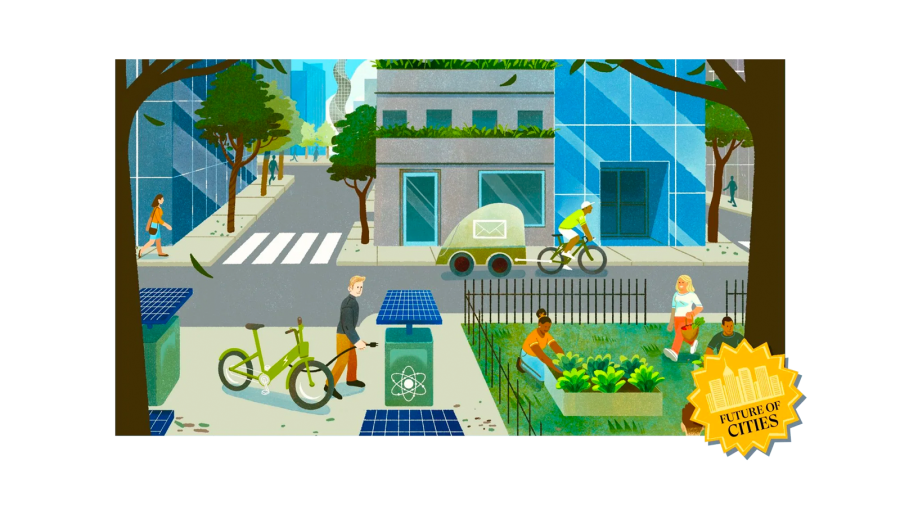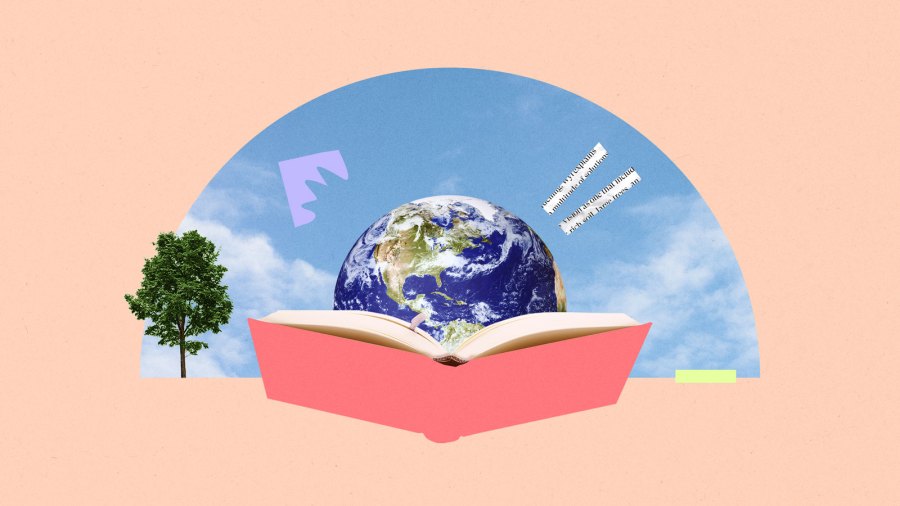The spotlight
A lot of proverbial shit hit the fan this past year — from a sobering IPCC report to catastrophic weather events to the realization that billionaires are giving up on this planet and racing each other to space. But there have been a lot of moments of inspiration as well. Long-fought pipeline battles were finally won. Major universities divested from fossil fuels. More people than ever before are aware of the risks that climate change poses. Even as the crisis worsens, these seeds of change have us eagerly craning our necks to see flowers in the years ahead.
That’s the premise of Fix’s 22 Predictions for 2022, which asks experts what’s coming for us in the fields of policy, tech, food, culture, and beyond. Check it out. Let it inspire your own resolutions, goals, and *manifestations* for the new year. And then tell us about them! We want to hear what you’re dreaming and scheming for 2022 to be part of building a better future.
Need a bit more inspiration? Our team has you covered. For this edition of the newsletter, we pulled together some of our favorite bright spots from the solutions, ideas, and people we covered over the past year — with takeaways that could spark resolutions of your own.

1. This TikTok star makes foraging a fun — and revolutionary — practice, by Anna Deen
This is a delightful Q&A with Alexis Nikole Nelson, known on social media as @blackforager. She uses her platform to educate people about the basics of foraging for your own food (including what it means to eat with the seasons and how to target invasive plants). Her work, and the story, also gets into the history of local food knowledge and racist laws that limited access to wild foods. It’s surprising, it’s intersectional, it’s rad.
— Claire Elise Thompson, associate editor
Resolution: Try something you’ve never eaten before — maybe something you can pluck out of your own backyard (watch some of Nelson’s vids for guidance) or a nearby public park. If that’s not comfortable for you, check out year-round farmers markets or CSAs; they can expose you to new varieties of treats and up your quotient of seasonal, local food.

2. Forget peanuts. George Washington Carver’s environmental legacy is the real story, by Brianna Baker
For Black History Month, we took a deep dive into the life and work of the extraordinary scientist George Washington Carver. It’s a fascinating look at a quiet revolutionary whose farming techniques laid the foundation for the modern organic movement — and helped formerly enslaved people achieve some measure of food sovereignty. Farmer (and Grist 50 honoree) Leah Penniman, who’s quoted in the piece, put it succinctly: “Flattening him to just a pinup with a peanut in an elementary school corridor does not do him justice.”
— Jaime Buerger, managing editor
Resolution: Challenge your assumptions. When it comes to history, people, solutions, problems, and most other nouns, there’s often more to the story than what you think you know.
3. One stolen whale, the web of life, and our collective healing, by Squil-le-he-le Raynell Morris and Tah-Mahs Ellie Kinley
The Miami Seaquarium calls her Lolita; the Lummi Nation calls her Sk’aliCh’elh-tenaut. In this lyrical, moving essay, two tribal matriarchs plead for the killer whale’s return home to the Salish Sea, “where she will be treated as family rather than as entertainment or a commodity.” This shot right to my maternal core; I will never think of whales — perhaps any living thing — the same way, which was exactly the authors’ intention. We are all connected in a “sacred web of life,” they write, and it “must be repaired strand by strand.”
— Jennifer Block, opinions editor
Resolution: Survey your own life for what needs reunification or repair. What have you compartmentalized or abandoned, thinking that it won’t have any impact on you, your community, or the planet?
4. How do you create the conservationists of tomorrow? Get kids outside, by Claire Elise Thompson
This article brought back vivid memories of my childhood as a country kid who spent most of my free time exploring nature. But it also served as a powerful lesson that it is the people around us — and the structural systems people have set up — who decide who is welcome to these natural experiences and who is not. The stories of the central characters (Vasquez, Ezeilo, and González) were both easily relatable and highly divergent from my own memories, and I love that this piece weaves together these tangible personal stories with the policy changes that will make a difference for so many.
— Lisa Jurras-Buchanan, co-director of Fix
Resolution: Be a good ally — and go with good allies — in the outdoors. Whether you’re strolling through a city park, going on your first backpacking trip ever, or hitting your favorite trail for the nth time, look out for your safety and the safety of others. That might mean brushing up on first-aid skills, packing extra supplies to share, or calling out shady behavior when you see it. Bring your own strengths, and draw on the strengths of everyone you’re exploring with, to help make the outdoors a welcoming place for all.
5. Resilience, community, and other lessons I’ve learned from my plants, by Brianna Baker
This Q&A with Beronda Montgomery, a plant biologist who also studies the art of mentorship, is a beautiful reminder of how much the environment can teach us. Her message is a familiar one, but one I love: We must function as a community just as plants function as one larger entity to successfully flourish. This piece has honestly made me think harder about the relationship I have with nature and all there is to learn from my friendly neighborhood greenery.
— Izania Gonzalez, Fix intern
Resolution: Look for inspiration everywhere. As Izania writes in Fix’s Mentorship Issue, “Mentorship can be found in all sorts of places and among all sorts of people; what’s important is the choice to engage in learning and understanding.” Even your plants, or a favorite TV show, can become valuable sources of guidance — all you have to do is listen.

6. The Secrets of the Last Greenland Shark, by Mike McClelland
You owe it to yourself to read every one of the amazing stories in our Imagine 2200 climate-fiction short story collection, but if you read only one, make it this one. This wildly imaginative and heartbreaking story is among the best things I’ve read in any genre this year. I’ve read it a dozen times and it never fails to make me tear up. Wonderful in every sense of the word.
— Chuck Squatriglia, senior editor
Resolution: Let yourself grieve. Climate change and its associated crises — extinction, natural disasters, ecosystem loss — are tragic. Climate art like the short story above can offer some much-needed catharsis as you process those feelings. It can also help you see ways of turning grief and anxiety into action.
7. On mentorship: Climate leaders in conversation, Season 2 of Temperature Check, a podcast by Fix
There’s something so intimate about listening to these conversations between mentors and mentees in climate and justice work. Some of the conversations are deeply moving, some are spirited and joyful, and after each one I walked away with a new perspective on what it will take to achieve a just, sustainable world — the work it will take, the voices that need to be heard, and the relationships that make it possible. Plus, these conversations made me want to connect more deeply with the people in my own life who sustain and uplift me.
— Jess Stahl, co-director of Fix
Resolution: Thank your mentor. Whether it’s your parent, a teacher, a friend who inspires you, or someone whose Instagram you learn from on a daily basis, let them know how they’ve impacted you. If you’ve got the kind of relationship to have a sit-down heart-to-heart conversation, we’ve got a guide to get you started.

8. The cities of 2121: Changemakers envision the future they’re working toward, by Claire Elise Thompson
I love cities. I love talking about the future. And I love discussing how we’re going to get to that clean, green, and just world we all deserve. This multimedia piece (I listened to some parts while walking my dog) is a mashup of all those lovely things. The people and the solutions run the gamut: How will we grow our food? Why is grass a waste of space? What will free transportation look like? — and a host of other interesting challenges.
— Tory Stephens, network weaver
Resolution: Dream up that future, baybee. Maybe you want to make a vision board, write a drabble, or just let your mind wander. What does the world you want truly look like? And how can you start living that way now?
See for yourself
Feeling inspired? Ready to tell us all about your plans for a clean, green, and just 2022? Let’s hear ’em.
We’ll gather up all the inspiration you share with us and send it back out to the Looking Forward community in the new year.
A parting shot
This illustration for the Climate Fiction Issue has a special place in my heart. The issue explored the power of climate fiction in imagining a more sustainable future for the planet, and I thought the pop-up book imagery was a sweet way to visualize that, a world blooming from book pages. It also includes the tiniest of Easter eggs — clippings from an excerpt of Afterglow, the first-place winner of our climate-fiction contest. Check out the issue on our site for the full experience.
— Mia Torres, designer



